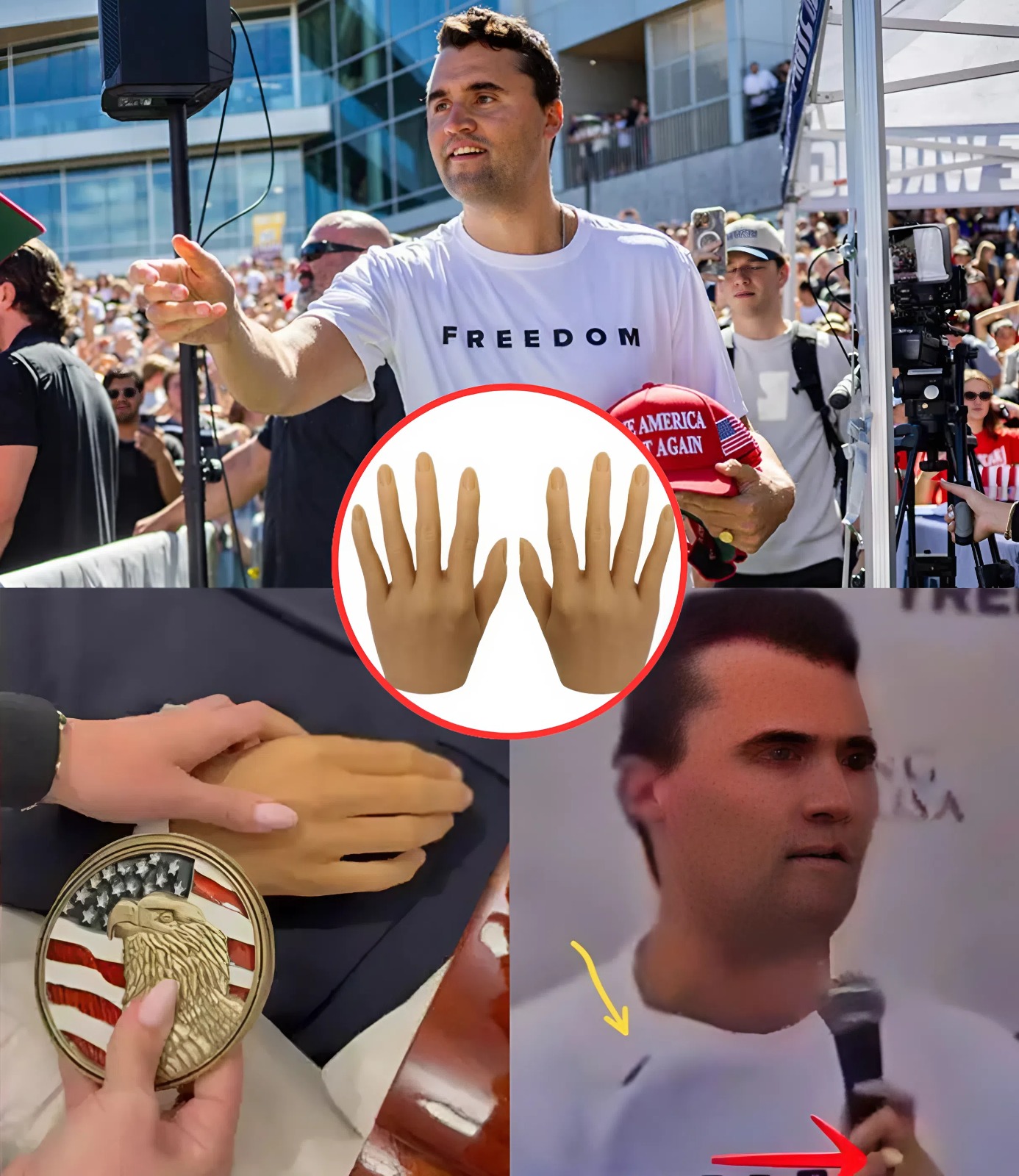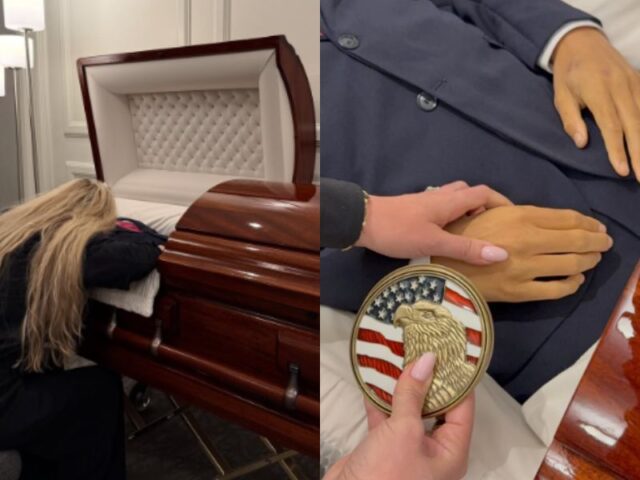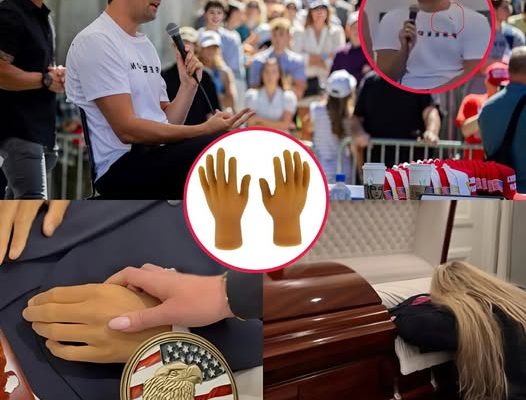
When news first broke that political commentator Charlie Kirk had been fatally shot, the reaction was immediate and overwhelming. Headlines described it as a senseless tragedy, tributes poured in from allies and critics alike, and within hours the story dominated every corner of social media. Yet in the weeks since, the narrative has shifted dramatically. Whispers of a cover-up, speculation about a faked death, and disturbing details from eyewitnesses and investigators have combined to form a picture far more unsettling than anyone initially imagined
What truly happened on that September night remains shrouded in uncertainty, but one fact is undeniable: the official story does not fully align with the fragments of evidence now surfacing. And if the rumors are even partially true, then Kirk’s death may represent not only the silencing of a public figure but also the opening chapter of something larger, darker, and far-reaching.

The Night of the Shooting
At 11:42 p.m., in a dimly lit corner of downtown Chicago, the sound of a single gunshot shattered the silence. Witnesses claim they saw Kirk collapse outside a café where he had been spotted hours earlier meeting with associates. Emergency responders arrived within minutes, but according to reports, he was unresponsive at the scene and pronounced dead shortly thereafter.
That timeline, however, immediately raised questions. Several bystanders recall hearing not one, but two shots. Others insist they saw a man running from the scene, yet no official police statement has acknowledged a suspect. Perhaps most bizarre, multiple surveillance cameras that should have captured the incident were reportedly malfunctioning at the exact moment of the shooting.
Coincidence? Or something more?
Rumors of a Staged Death
Within days, speculation erupted online that Kirk’s death was staged. At first, such claims seemed outlandish, the product of conspiracy-driven corners of the internet. Yet the more people scrutinized the details, the more anomalies appeared.
Why did the hospital’s statement about the cause of death differ from the police report by nearly four hours? Why was the body reportedly transported twice before arriving at the medical examiner’s office? Why did Kirk’s family release a statement so brief, so restrained, that it read almost as if it had been drafted by lawyers rather than grieving loved ones?

Chilling Eyewitness Testimonies
What makes this case particularly haunting are the accounts of those who claim to have seen what really happened that night.
One café worker, speaking under condition of anonymity, described seeing a figure approach Kirk moments before the shot. “He turned his head like he recognized the person,” the witness recalled, “but then the figure just… disappeared. I don’t mean ran away. I mean vanished, like a shadow pulled into the dark.”
Are these mere coincidences? Or do they point to a method of attack far outside the realm of ordinary violence?
The Autopsy That Raises More Questions Than Answers
Leaked details from the autopsy have done little to calm speculation. According to insiders, the entry wound was unusual—precise, almost surgical, with none of the expected tearing or trauma consistent with a high-caliber bullet. Even stranger, internal bleeding was far less than anticipated, leading one medical examiner to reportedly say, “It was as if the body didn’t respond like a normal human body would to a gunshot.”
If true, this raises an extraordinary question: was Kirk struck by something other than a conventional bullet?
Forensic specialists contacted by our team point out that experimental weaponry, including electromagnetic projectiles and chemical agents, could in theory leave such traces. While such claims sound closer to science fiction than reality, history is replete with examples of governments and organizations testing weapons the public was never meant to know about.
Motives and Enemies
Why would anyone stage Kirk’s death—or silence him permanently?
As a controversial commentator and activist, Kirk had no shortage of political enemies. His critics viewed him as a polarizing figure, while his supporters celebrated him as a truth-teller unafraid to confront the establishment. In the weeks leading up to his death, he had hinted at “explosive information” he intended to reveal regarding government surveillance and media manipulation. Could his death—whether real or staged—be linked to those claims?
Social Media Frenzy and Public Distrust
The vacuum of clarity has been filled by a tidal wave of online speculation. Hashtags like #KirkLives and #KirkConspiracy have trended for days, with millions debating theories. Some argue that the missing surveillance footage proves government involvement. Others see the restrained family statements as evidence of coercion or protection.
Psychologists warn that such speculation, while understandable, can deepen public distrust in institutions. Yet many citizens argue the opposite: that blind faith in official narratives is more dangerous, and demanding transparency is an act of civic responsibility.
The frenzy itself has become part of the story. Each new rumor, each leaked fragment of evidence, fuels a cycle of outrage, confusion, and suspicion. In this sense, Kirk’s death has become more than a tragedy—it has become a mirror reflecting America’s fractured relationship with truth itself.

A Case That Refuses to Close
Behind the scenes, investigators remain tight-lipped. Sources say dozens of interviews have been conducted, digital records analyzed, and physical evidence re-examined. Yet weeks later, no suspect has been identified, no clear motive established, and no definitive conclusion reached.
That vacuum of answers ensures that speculation will continue to flourish. And with each unanswered question—about the missing footage, the anomalous autopsy, the strange eyewitness details—the possibility grows that Kirk’s story is not simply about one man’s death, but about something much larger: power, secrecy, and the manipulation of public perception.
Conclusion: The Truth Still Hangs in the Shadows
Charlie Kirk’s death, once reported as a straightforward shooting, now sits at the crossroads of tragedy and mystery. Some believe he was murdered for what he knew. Others insist he faked his death to escape or expose a system too dangerous to confront openly. Still others fear the truth lies in a realm even darker—where experimental weapons, cover-ups, and psychological operations intertwine.
What is clear is that the official narrative is unraveling under scrutiny. Each new leak, each new testimony, adds weight to the sense that we are not being told the full story. Whether Kirk is gone forever or watching from the shadows, his death has ignited a firestorm of questions that demand answers.
And until those answers come, America will remain suspended between grief and suspicion, caught in the haunting possibility that what we think we know about Charlie Kirk’s death is not the truth at all—but the beginning of something far more disturbing.




